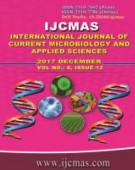


 National Academy of Agricultural Sciences (NAAS)
National Academy of Agricultural Sciences (NAAS)

|
PRINT ISSN : 2319-7692
Online ISSN : 2319-7706 Issues : 12 per year Publisher : Excellent Publishers Email : editorijcmas@gmail.com / submit@ijcmas.com Editor-in-chief: Dr.M.Prakash Index Copernicus ICV 2018: 95.39 NAAS RATING 2020: 5.38 |
Beer is the world’s oldest and most widely consumed alcoholic beverage. The brewing industry is one of the largest users of water, approximately 3 to 10 litres of waste effluent is generated per litre of beer. An investigation was conducted for the utilization of brewery wastewater generated from United Breweries Ltd., situated at Kanjikode, Palakkad District, Kerala state for crop cultivation using different organic amendments. The brewery wastewater was colourless and odourless. The total dissolved solids content was 1320 mg L-1, neutral in reaction (7.05) and the wastewater showed an electrical conductivity of 1.96 dS m-1. The effect of organic amendments under brewery wastewater irrigation on growth of sesame was assessed in field condition. The data of 90 days after sowing (DAS) showed that the brewery wastewater irrigation and the application of different levels of amendments markedly improved the growth of sesame. The yield attributes of sesame (number of capsules per plant, number of seeds per capsule, number of seeds per capsule and test weight) were significantly improved with the addition of amendments in combination with brewery wastewater irrigation. The treatments had significant impact on crop residue and seed yield. The seed yield varied from 433 to 804 kg ha-1. The continuous reuse of brewery wastewater might lead to a salinity buildup, as well as contribute to the deterioration of soil quality. The control application along with the use of organic amendments leads to improve the soil quality as well as the crop yield.
 |
 |
 |
 |
 |